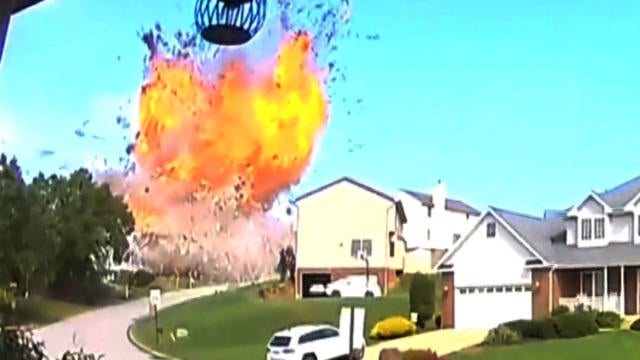Yes, an electric water heater can explode under certain conditions. Common causes include excessive pressure, faulty thermostats, and sediment buildup.
Electric water heaters are popular for their efficiency and convenience. They provide a steady supply of hot water for homes and businesses. However, safety concerns arise when these units malfunction. Accumulated sediment can lead to overheating, while a malfunctioning pressure relief valve may cause dangerous pressure buildup.
Regular maintenance is vital to prevent potential issues. Understanding the risks associated with electric water heaters can help homeowners take preventive measures, ensuring a safe and reliable hot water supply. This knowledge not only enhances safety but also extends the lifespan of the appliance. Being proactive can save time, money, and stress in the long run.
Page Contents
- 1 The Possibility Of Electric Water Heater Explosions
- 2 Understanding Water Heater Mechanics
- 3 Warning Signs Of Potential Danger
- 4 Regular Maintenance Protocols
- 5 Safety Features In Modern Water Heaters
- 6 Emergency Response To Water Heater Issues
- 7 Installation And Placement Tips
- 8 Legal And Insurance Considerations
- 9 Conclusion
The Possibility Of Electric Water Heater Explosions
Electric water heaters can explode under certain conditions. Pressure buildup is a major factor. If the temperature exceeds safe limits, the risk increases. A faulty temperature and pressure relief valve can also cause issues. Regular maintenance helps prevent these problems.
Statistics show that thousands of water heater explosions occur each year. Many incidents result from lack of maintenance. Poor installation can lead to dangerous situations. Understanding these risks is essential for safety.
| Factor | Risk Level |
|---|---|
| Pressure buildup | High |
| Faulty valves | Medium |
| Poor installation | High |
| Lack of maintenance | High |
Understanding Water Heater Mechanics
Electric water heaters use electricity to heat water. They have two main parts: a heating element and a thermostat. The heating element warms the water inside the tank. The thermostat controls the temperature of the water.
Common failures can happen. A faulty thermostat may cause overheating. This can lead to excessive pressure. If pressure builds up too much, it may cause an explosion.
Another issue is a broken heating element. This can lead to leaks. Leaks can create water damage and increase the risk of electrical shock.
Regular maintenance helps prevent these problems. Check the pressure relief valve often. This valve helps release extra pressure and keeps the heater safe.
Warning Signs Of Potential Danger
Unusual noises from an electric water heater can signal problems. Sounds like popping, rumbling, or banging may indicate sediment buildup. This sediment can cause overheating and lead to dangerous situations.
Leaks and water puddles around the heater are serious signs. Water pooling can mean a crack in the tank. This can lead to a sudden failure, causing an explosion. Always check for wet spots and report issues immediately.
Staying alert to these signs can protect your home. Regular maintenance can help avoid serious problems. Always consult a professional for repairs.
Regular Maintenance Protocols
Regular maintenance is key for electric water heaters. Follow this inspection checklist:
- Check the temperature and pressure relief valve for leaks.
- Inspect the drain valve for blockages.
- Look for any signs of rust or corrosion.
- Ensure the heating elements are clean and working.
- Check the thermostat settings for accuracy.
Implementing these preventative measures can help avoid potential issues:
- Flush the tank at least once a year.
- Insulate the tank and pipes for energy efficiency.
- Keep the area around the heater clear and dry.
- Schedule a professional inspection every few years.
Safety Features In Modern Water Heaters
Modern water heaters come with important safety features. These features help prevent dangerous situations, like explosions.
Temperature and Pressure Relief Valves are essential components. They release excess pressure and temperature safely. This prevents the tank from bursting.
Auto-Shutoff Mechanisms are another key feature. If the heater gets too hot, it turns off automatically. This helps to avoid overheating and potential hazards.
These safety features work together. They ensure that electric water heaters operate safely and efficiently. Regular maintenance is vital to keep these systems functioning well.

Credit: www.reddit.com
Emergency Response To Water Heater Issues
Electric water heaters can be dangerous. Explosions may occur if they are not maintained. Check for leaks or unusual sounds. These signs may indicate problems. Heating elements can overheat and cause issues.
Call a professional if you notice any of these problems. Safety is the top priority. Don’t attempt to fix major issues alone. A qualified technician can assess and repair your heater. Regular maintenance helps prevent serious problems.
| Signs to Watch For | Action Needed |
|---|---|
| Strange noises | Call a professional |
| Water leaks | Turn off power and call for help |
| Rusty water | Schedule maintenance |
| Burning smell | Turn off immediately and contact an expert |
Installation And Placement Tips
Choosing the correct size for an electric water heater is very important. A properly sized unit ensures efficiency and safety. Consider the number of people in your home. This helps in determining the right capacity.
The location of the heater also matters. Place it in a dry and well-ventilated area. Avoid areas with high moisture levels. This prevents rust and damage to the heater.
Hiring a professional for installation is often safer. They understand all safety codes and requirements. DIY installation can save money, but mistakes can be costly.
Choose the best option based on your skills and comfort level. Always prioritize safety to avoid potential issues.

Credit: www.homeinspectionauthority.com
Legal And Insurance Considerations
Compliance with building codes is essential for safe water heater operation. Local laws dictate installation and maintenance standards. Following these rules can prevent accidents and ensure safety.
Insurance coverage for water heater explosions is crucial. Many policies cover damage caused by these incidents. Check policy details to understand what is included. Some companies may require compliance with building codes for coverage.
| Insurance Provider | Coverage Type | Requirements |
|---|---|---|
| Provider A | Full Coverage | Building code compliance |
| Provider B | Partial Coverage | Regular maintenance records |
| Provider C | No Coverage | Installation by licensed plumber |

Credit: www.cbsnews.com
Conclusion
Electric water heaters can pose risks, including the potential for explosion. Regular maintenance and safety checks are essential to prevent such incidents. Understanding the signs of malfunction can protect your home and loved ones. Stay informed and proactive about your water heater to ensure it operates safely and efficiently.
